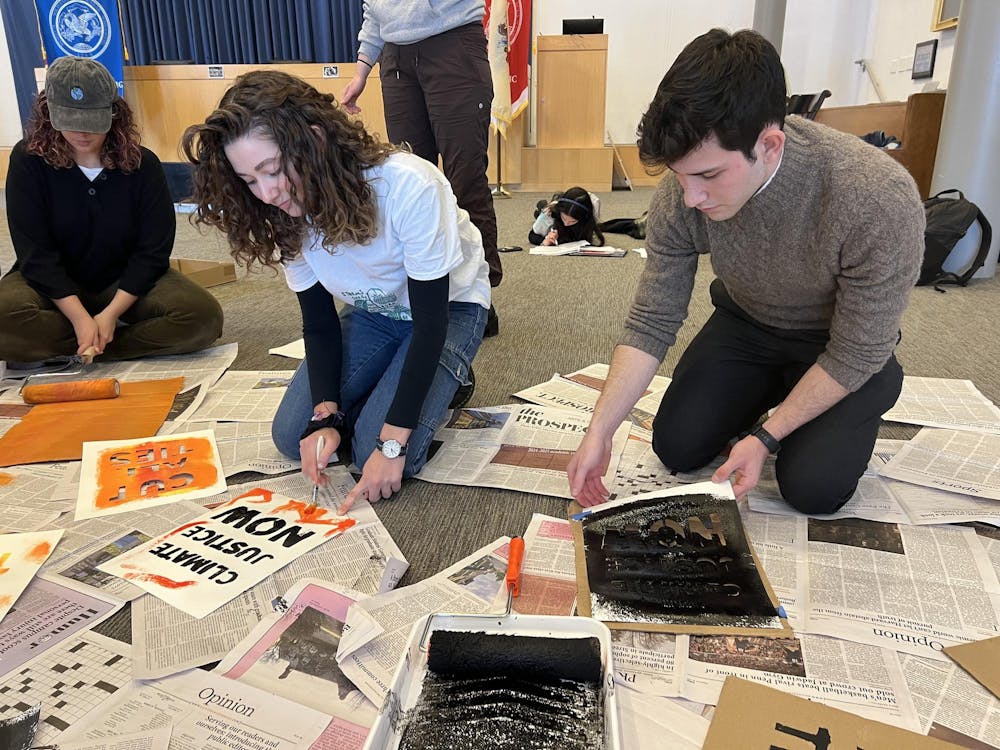Student climate organizers on campus finalized the transition from Divest Princeton to Sunrise Princeton at a launch event on Saturday. The transition to Sunrise Princeton ushers in a “new era of climate justice organizing on campus,” co-coordinator Alex Norbrook ’26 said at the launch event on Saturday.
Norbrook is a columnist for The Daily Princetonian.
The rebrand also means the organization will join the national Sunrise Movement, a political action organization that aims to “stop the climate crisis.” Since its founding in 2017, the Sunrise has lobbied for the Green New Deal and gained national attention for leading a sit-in in Speaker of the House Nancy Pelosi’s office alongside Justice Democrats and Representative Alexandria Ocasio-Cortez.
Divest Princeton — comprised of current students, alumni, and faculty — has led campus climate activism efforts since 2019. However, since the University announced its plans to fully divest from all publicly-owned fossil fuel companies in fall 2022, undergraduate student activists saw a need for a “new kind of organizing on campus,” co-coordinator Eleanor Clemans-Cope ’26 told the ‘Prince.’
Clemans-Cope is the head Opinion editor for the ‘Prince.’
“Divest, dissociate, and decarbonize are all very important. What we’re also moving towards is demanding that Princeton invest in global climate solutions, to invite frontline perspectives and protect people in the community, and to innovate climate solutions on campus,” she said.
“We recognized that it was time for us to move out of just the financial space and also the reinvestment space, into what Princeton can do for its community,” she continued.
Princeton has adopted a number of climate initiatives as part of its 2019 Sustainability Action Plan. Recently, the New York Times featured Princeton’s geoexchange project, calling it “a new system that will keep buildings at comfortable temperatures without burning fossil fuels” in a Jan. 23 piece. The project is part of Princeton’s plan to achieve carbon neutrality by 2046, four years before the global deadline set by the European Union and the United States.
Currently, Sunrise Princeton is “starting discussions with partners in the community” to address direct concerns about decarbonization.
Divest Princeton alumni organizer Lynne Archibald ’87 told the ‘Prince’ that the move to Sunrise Princeton is less of a “transition” away from Divest Princeton and more of a “branching out,” adding that she expects collaboration between the two groups.
“I think that there's a lot of space available for environmental movements,” she said. “The more different groups that we have focusing on different things, highlighting different aspects of all the work that there is to be done, the better.”
In December 2023, the Princeton University Investment Company (PRINCO) announced the completion of its plans to eliminate holdings in publicly-traded fossil fuel companies. According to a February 2024 update, the Board of Trustees updated the list of companies subject to dissociation, increasing the number from 90 to 2,371. The Board of Trustees also removed eight companies from the dissociation list.

As of May 2022, Princeton had invested $1.7 billion of its endowment in fossil fuel companies. According to correspondences with University officials obtained by the ‘Prince,’ public companies account for $1 billion of this investment. Divest Princeton speculates that the remaining $700 million that are invested in private fossil fuel companies.
“The climate crisis is getting more and more severe, and also more and more unpredictable,” Clemans-Cope said. “That kind of pushed us into a new conception of what Princeton can do because as the urgency kicks off, the action must also kick off.”
Elisabeth Stewart is an assistant News editor for the ‘Prince.’
Please send corrections to corrections[at]dailyprincetonian.com.
Correction: This piece has been updated to further clarify Sunrise Princeton’s relationship to Divest Princeton.








